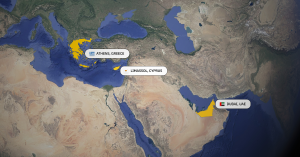On July 5th, the European Commission adopted a New European Innovation Agenda, which aims to boost tech innovation and startup activity in Europe. Among the goals listed in the plan is the development of new technologies to address societal challenges, improving access to finance, creating “regional innovation valleys” to help close the regional gap, and improving the policy framework for member states.
This initiative comes as no surprise since governments are crucial players in the innovation and technology ecosystem in the Union, especially as they try to bolster the European presence in creating global technology standards. The need for proper public policies and information coordination increases proportionally to the development of the ecosystem and to the willingness of the European policymakers to outrun its competitors in the face of the US and China.
Despite ranking high in the Global Innovation Index for 2021, some Central and Eastern European countries still tend to fall behind their fellow Western counterparts. That is why European leaders and policy makers have started stressing the importance of creating appropriate conditions for fostering talent, creating a fruitful business environment for start-ups and thus retaining the value created in their country of origin.
In this article, we get to discover who are the policy makers in the CEE region who act as a driving force for innovative developments. These public figures make up a small fraction of the ecosystem builders who fight to foster and accelerate innovation. This article is organized following the European and Regional Innovation Scoreboards 2021, and the countries follow the order of their ranking.
Policy makers from Slovenia
Name: Mark Boris Andrijanič
What’s on his agenda: Andrijanič was Slovenia’s first-ever Minister of Digital Transformation.
His name is closely related to the adoption of the Act on Promotion of Digital Inclusion, which is a law, regulating the acquisition of digital skills for all generations, especially the elderly. Andrijanič is currently out of office but his work continues to receive recognition as Ukrainian Vice-PM Mykhailo Fedorov presented him with the Ukrainian Peace Prize on behalf of Zelensky for supporting Ukraine in its digital resilience. He is a Member of the Governing Board of EIT – European Institute of Innovation and Technology and also part of the World Economic Forum’s Class of 2022 Young Global Leaders.
Name: Matjaž Han
What’s on his agenda: He is the Slovenian Minister of Economic Development and Technology. His most recent milestone consists in contributing to the signing of the Roadmap for Cooperation between Slovenia and the United Nations Industrial Development Organization. The expected outcomes are that this new document will strengthen the already existing cooperation and also foster further socioeconomic transformation with an emphasis on building the innovation ecosystem, transfer of know-how, and sustainable development.
Name: Dr Emilija Stojmenova Duh
What’s on her agenda: She is the current Minister of Digital Transformation in Slovenia. Her work primarily focuses on the areas of user-centric design, open innovation, co-creation, and digitalization for development. Despite being new to the office, Dr Duh has a long history as an innovation policy-maker having previously served as Executive Director of the Digital Innovation Hub Slovenia. Her most recognizable achievement is the implementation of the Demola Slovenia project, which works towards solving innovation challenges with the help of experts, university students, and organizations in the ecosystem. She is leading several R&D initiatives on digitization for innovation and rural development at the national and European levels.
Policy makers from the Czech Republic
Name: Helena Langšádlová
What’s on her agenda: She is the Minister of Science, Research and Innovation. She is also the chairperson of the Council for Research, Development and Innovation, which is an advisory body to the Government of the Czech Republic that focuses on policy making, international cooperation, and implementation of research priorities in certain areas. Despite budgetary cuts, the ministry still managed to secure an increase in the science and research budget by EUR 65 million compared to last year.
Name: Ivan Bartoš
What’s on his agenda: Bartoš is likely to be one of the people mostly discussed in the next six months as the Czech Minister of Regional Development and Deputy Prime Minister for Digitalization since the Czech Republic took the presidency of the Council of Europe for the second part of 2022. He embraces principles that revolve around open government and individual privacy. He is also the founder of Czech Pirates, a political fringe group with international branches that was created to oppose copyright laws. Bartos’s team has been working on a standardized artificial intelligence rulebook for all 27 EU members and will be in the spotlight pushing tech laws in Brussels.
Policy makers from Cyprus
Name: Kyriacos Kokkinos
What’s on his agenda: Kokkinos is the Deputy Minister to the President of Cyprus for Research, Innovation and Digital Policy. Dr Kokkinos’ contribution to the integrated strategy for digitalization of the social services in the country has been duly noted by multiple officials. The latest milestone for the country’s modernisation plan focuses on the implementation and digitalization of the childbirth aid services provided by social insurance offices. However, this is just one of the many mechanisms that the government undertook to increase efficiency and save citizens’ time.
Policy makers from Hungary
Name: János Csák
What’s on his agenda: Csák is the head of the newly formed Ministry of Culture and Innovation in Hungary. Even though he is new to the office, the minister has already declared the expected increase in expenditures for R&D and innovation in the country from 1.6% of GDP to 3% by 2030. On his agenda, Cšak shares that he will prioritize vocational training, higher education, and science, as well as improving all systems that increase Hungary’s knowledge, creativity, and business skills and promote the growth of new ideas.
Policy makers from Serbia
Name: Nenad Popović
What’s on his agenda: Popović is the Serbian Minister of Innovation and Technological Development. A former entrepreneur, he joined the public sector to contribute to the development of Serbia’s innovation and technological ecosystem. Popovič’s ministry is currently in charge of the Serbian Government to reach a strategy plan for tech development by 2025. During the preparation of the strategy the needs and concerns of the ecosystem players will be taken into consideration. In addition to the Serbian Innovation Fund, part of the national innovation strategy, and the new venture capital fund, which will be owned by the national mobile operator, Telekom Srbija, the minister mentioned the opening of about 20 innovation centers for young entrepreneurs as drivers of the high ranking.
Policy makers from Bulgaria
Name: Mariya Ivanova Gabriel
What’s on her agenda: She is the European Commissioner for Innovation, Research, Culture, Education and Youth and also one of the creators of the New European Innovation Agenda. Currently, Gabriel is on the lookout for support on the Agenda, which will bear the burden of helping European start-ups deal with issues related to hiring talent and accessing capital. The tools that Gabriel outlines as crucial are better access to finance, improved rules, regional innovation valleys, focus on talents & support to women founders and clearer policy-making and support to the European Member States. The Agenda would also deal with the training insufficiencies and in the words of Gabriel will strive to ensure training for 1 million people in deep tech.
Name: Daniel Lorer
What’s on his agenda: Lorer is the Bulgarian Minister of Innovation and Growth in resignation as the country heads for new elections in the fall. Before entering the political arena in Bulgaria, Mr Lorer was an entrepreneur with several successful exits and an investor with the Bulgarian VC fund BrightCap Ventures. In his new venture, the minister emphasizes the importance of renewed public policy, namely regulating governmental spending on R&D and investments on the way to transforming Bulgaria into a regional innovation hub and a country abiding by the rule of law to improve the perception investors have of Bulgaria. Lorer also likes to popularize the notion of unicorns, now that Bulgarian companies make their exits and new capital enters. The minister emphasizes that there is much work in the field of innovations and the verticals that need extra focus include energy, digitalization of government services, and companies’ infrastructure, and green transition.
Name: Bozhidar Bozhanov
What’s on his agenda: He is the minister in resignation for e-governance in Bulgaria. In his role in the newly found ministry, the job of Bozhanov is to ensure the digitalization of different governmental processes. Bozhanov believes that e-government is the basis of trust between people and government; his ministry aims to help Bulgarian citizens engage and communicate easily and digitally with Bulgarian institutions. He fast-forwarded the process of introducing digital IDs, made public the system for electronic budget payments, and took active measures to improve the country’s digital security.Prior to his public role, Bozhanov was the co-founder of cybersecurity company LogSentinel, an information security company helping businesses of all sizes to prevent data breaches and simplify compliance.
Name: Denitsa Simeonova
What’s on her agenda: Simeonova is a Member of the Bulgarian Parliament and a social entrepreneur. The MP has concentrated her efforts on ratifying the agreement with the European Space Agency, through which Bulgarian companies can participate actively in the space industry in Europe as well as
the creation of a new trading mechanism with variable capital, which will allow companies to more easily recruit third-party financing and attract and retain talents within Bulgaria. Simeonova has also been actively participating in the planning procedure for obtaining a blue card and a start-up visa as well as enabling cross-border financing for entrepreneurs in the region.
Name: Elena Andonova
What’s on her agenda: Elena is a Bulgarian Policy Officer and programme manager at the Competence Center on Technology Transfer for the European commission. Elena has been working to support the development of the innovation ecosystem by utilizing financial instruments and easing technological transfers. Recently, Elena worked on reshaping the functional and operational capacity of the Sofia Tech Park, which hosts innovative companies and researchers in Bulgaria. According to the briefing of the Commission, the aim of the project was to strengthen the functional and operational capacities of the park. The outcomes reportedly led to some recommendations which focused on increasing the role and involvement of the State.
Policy makers from North Macedonia
Name: Kreshnik Bektishi
What’s on his agenda: He is the Minister of Economy in the Republic of North Macedonia. Bekteshi is one of the ultimate supporters of Macedonian integration in the EU, as the country is bound to receive up to 60% more funding to support entrepreneurship, employment, and innovation. Presently, working on the Operational Plan with Bekim Murati, the director of the Employment Agency of the Republic of North Macedonia, Mr Bektishi declares that the goal of the plan is to help out over 20K unemployed people who have a knack for self-employment and entrepreneurship. Earlier this year, Bektishi signed a memorandum to help promote the flow of investments and information regarding policies, exchange of experiences in organizing and administering activities and mutual exchange and cooperation between the RNM and Bulgaria.
Policy makers from Romania
Name: Diana Buzoianu
What’s on their agenda: Buzoianu is a 27-year-old member of the Romanian Chamber of Deputies and also one of the notable advocates of the introduction of the Digital Nomad Visa in the country. Buzoianu has a background in law and a bright vision for the digitalization of Romania. Her efforts alongside those of the Ministries of Foreign and Internal affairs started back in May 2021 and a year later, Romania started implementing the visa with the expectation of attracting international citizens to the country.
Name: Marcel Bolos
What’s on his agenda: He is the Romanian Minister of Investments and European Projects. His work on completing the different milestones under the National Resilience and Recovery Plan (NRRP) set by the European Commission places him in a favorable position, as the Romanian Government will have the opportunity to ask for funding of 10 billion euros for infrastructural projects. Bolos’ focus falls on emphasizing the urgency of switching to green sustainable energy.
Name: Sebastian Burduja
What’s on his agenda: Burduja is the newly appointed Minister of Research, Innovation, and Digitalization in the Government of Romania. His work in the ecosystem starts with his early years while still studying abroad. He took part in the founding of the RISE Consortium, a network of enterprises whose goal is to draw foreign investment to Romania and aid local businesses in expanding abroad. His political goals focus on enhancing research and innovation for Romania’s development. He stresses the importance of recognizing the performance of individual researchers and research organizations. He supports the continuous improvement of research conditions and infrastructure which will eventually attract Romanian researchers from the diaspora and top foreign researchers.
Policy makers from Ukraine
Name: Mykhailo Fedorov
What’s on his agenda: Fedorov is Ukraine’s Deputy Prime-minister and the Minister of Digital Transformation. Fedorov’s project “state in a smartphone”, which he first drafted upon his election, originally aimed to digitize all government services by 2024. Since the Russian invasion, the process has been sped up. In addition to his diplomatic pleas to tech leaders from Starlink, Apple, Microsoft and Meta for cooperation against Russia, Federov has been working towards enabling Ukrainians to perform administrative tasks without visiting governmental offices. Apart from allowing the government to operate in critical circumstances, this policy is part of a bigger plan to digitize multiple systems in Ukraine.







